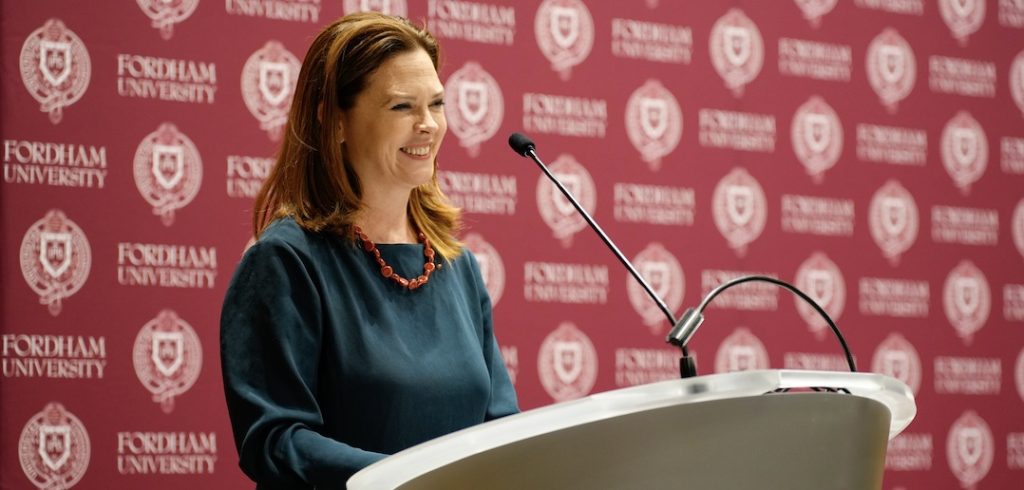Below are key points from her address, held at the Lincoln Center campus.
Remember where we come from. “The reason I came, the reason many of you tell me that you are here, is that we are proudly not a school that functions merely for the entitled. Twenty percent of our students are first-generation and Pell, and I am proud to announce 48% of the incoming class are students of color—the most diverse in Fordham’s history,” she said. “We exercise enormous power as gatekeepers, even as the Supreme Court has tied our hands. We make the dream of meritocracy real, and we know the impact we have—all of us—on the trajectory of our students’ lives.”
Fordham—and the world—are facing unprecedented challenges. Among them are climate change, as evidenced by the “orange” smoke pollution that hit New York City this summer and the recent Hawaii wildfires, she said, and the perils of artificial intelligence. “Last spring, we watched in awe at the sight of technology teaching itself, passing the LSAT and the medical boards and writing lyric poems in seconds,” she said. “We realized that artificial intelligence will transform not just the classroom, but education itself—transform not just the skills our students need, but disrupt the economy they inherit.”
Our research should address the world’s most pressing problems. “Not just with science, not just with further technology, but by defining the core of what it means to be human before we lose that core,” she said. Instead of chasing the competition, do research that matters: “What if we focused on the research that matters most to the world … What if we figured out how to move beyond our disciplinary silos to find the answers to complicated problems?”
Instead of chasing status, we must focus on our values and integrity. There are many institutions Fordham can neither outspend nor beat in the game of status, she said. “But we can attract students with real credibility because we care more about the world. Our values, integrity, and impact are not merely performative. They come with 500 years of credibility as a Jesuit institution,” she said.
We must lean into the central tenets of Jesuit teaching in the classroom. “[Our students] grew up in a maelstrom of anonymous social media bullying, and they often question the value of just countering insulting speech with more speech. But we have to teach them how to embrace growth, how to weather constructive criticism, and how to engage in civil discourse when they see few examples of it,” Tetlow said. “That work will become harder and harder, particularly as the presidential election and our politics of division loom, but we cannot hold back in fear.”
Faculty are reimagining the undergraduate core curriculum. “How do we better prepare our students for the unrelenting pace of change?” she asked, acknowledging the challenges of the process. “How do we hold onto what is core, quite literally, while acknowledging the new sets of skills our students will also need?”
Fordham has two new members who are critical to the University’s growth: President Tetlow introduced Justin Bell, inaugural vice president for marketing and communications, and Tokumbo Shobowale, incoming chief financial officer, who both attended the address held in the McNally Amphitheater.
Last year was the second most successful fundraising year in Fordham’s history. “The quality of our ideas, the scale of our ambitions is also what will excite our alumni to give back,” she said. “And it’s working.”
The next University town hall will be held on Oct. 10. In her presentation, Tetlow will review University data and metrics, trends, and “where we struggle and where we flourish.”
After her address, Tetlow invited attendees to join breakout sessions focused on the pragmatic problem solving and big-picture thinking needed to move the University forward.
Watch the full address below:


